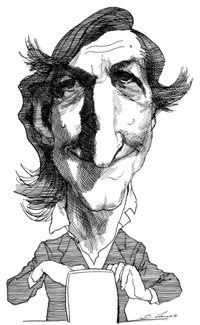 In the latest issue of the New York Review, Cathleen Schine reviews Levels of Life, a new book by Julian Barnes. It’s described as a three-part meditation on grief, following the death of Barnes’s wife Pat Kavanagh.
In the latest issue of the New York Review, Cathleen Schine reviews Levels of Life, a new book by Julian Barnes. It’s described as a three-part meditation on grief, following the death of Barnes’s wife Pat Kavanagh.
One of the things that is of no solace to Barnes (and there are many) is religion. He writes:
When we killed–or exiled–God, we also killed ourselves…. No God, no afterlife, no us. We were right to kill Him, of course, this long-standing imaginary friend of ours. And we weren’t going to get an afterlife anyway. But we sawed off the branch we were sitting on. And the view from there, from that height–even if it was only an illusion of a view–wasn’t so bad.
I can’t disagree. Atheists often proclaim the death of God in positively gleeful terms, but it’s important to recognize what was lost–a purpose in living, a natural place in the universe. The loss is not irretrievable; there is nothing that stops us from creating our own meaning even if there’s no supernatural overseer to hand one to us. But it’s a daunting task, one to which we haven’t really faced up.
Thank you so much for introducing me to this book. Barnes writes with an economy that is marvelous to behold–and conveys such depth of feeling. “Levels of Life” was the most beautiful meditation of grief that I have read.
Atheists often proclaim the death of God in positively gleeful terms, but it’s important to recognize what was lost–a purpose in living, a natural place in the universe.
I fail to understand how the existence of sme supernatural being can change our purpose in life in any way, unless we decide to enslave ourselves for a supernatural being, that is. Life’s purpose, or lack thereof, is in us, and only in us. We decide what it’s going to be, every step along the way we effect that very decision. Life’s circumstances nudge us this way and another, yet ultimately the decision is solely on our shoulders. Remember: the purpose is a mental construct. It’s in our head, and only there. By the very definition, unless we’re out to redefine our very language as we go along.
Since the ability to have a purpose in life is demonstrably (it takes only one, you know) not linked to declared presence (or absence) of a supernatural being, I tend to ascribe the lack thereof to personal shortcomings, not an innate necessity. Do note that personal shortcomings can well be, and often are, a result of external social circumstances. It’s more that the people that were around one as one grew up have decided a-priori when one can have a purpose in life. That’s not faith, that’s enslavement.